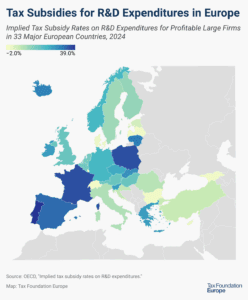
Impact of Elections on French Tax Policy and EU Own Resources
5 min readBy:The votes are in. The French election results are paralyzing for French pro-growth tax reforms, pessimistic for EU own resources, and dire for overall economic certainty.
Despite winning a second presidential mandate in April, French President Emmanuel Macron’s parliamentary party, alliance Ensemble!, lost its absolute majority in the National Assembly.
The National Assembly’s support of Macron’s taxA tax is a mandatory payment or charge collected by local, state, and national governments from individuals or businesses to cover the costs of general government services, goods, and activities. agenda is important for three reasons. First, the Assembly approves tax proposals at the national level. Secondly, it has influence over policy strategies at the EU level. Thirdly, and potentially most importantly, the main opposition party conventionally receives the Chairmanship of the powerful finance committee which dictates the pace of tax legislation.
If convention is followed, either a far-left or a far-right Member of Parliament will have the Chairmanship. It is yet to be seen if a coalition of different parties will qualify as the largest opposition party for Chairman purposes under parliamentary rules.
During his first mandate, Macron’s administration incrementally reduced the corporate tax rate from 33 percent in 2017 to 25 percent in 2022, transformed a solidarity wealth tax into a real estate wealth taxA wealth tax is imposed on an individual’s net wealth, or the market value of their total owned assets minus liabilities. A wealth tax can be narrowly or widely defined, and depending on the definition of wealth, the base for a wealth tax can vary. to boost investment, reduced social charges for employers, and attempted to implement a carbon tax before changing course after the Yellow Vests protests.
With a debt to GDP ratio of 115 percent in 2021, and an expected ratio of 116 percent by 2024, Macron has made the case that France needs to spur growth through investment. This requires, in his opinion, a loosening of the French labor market and a pro-growth tax code to make France more competitive.
Macron has pledged to continue to implement additional tax reforms in France during a second mandate. He announced he would increase the retirement age from 62 to 65, reduce taxes by 15 billion euros per year, make some benefits conditional on community work, and reform unemployment insurance to encourage people to return to work. This would be in addition to more subsidies for single mothers and inheritance tax breaks for those leaving money to their grandchildren or nieces and nephews.
Furthermore, Macron has made it clear that he wants France to be one of the first countries to stop using fossil fuels and believes in building a European metaverse to compete with U.S. tech companies. It is unclear what role a carbon taxA carbon tax is levied on the carbon content of fossil fuels. The term can also refer to taxing other types of greenhouse gas emissions, such as methane. A carbon tax puts a price on those emissions to encourage consumers, businesses, and governments to produce less of them. or a digital services tax would play in these pursuits.
At the EU level, Macron has traditionally been in favor of new own resources for the EU budget. As president of the Council, France has pushed for adoption of Pillar 2 of the OECD agreement, the Carbon Border Adjustment Mechanism (CBAM), and reforms to the Emissions Trading System (ETS). The OECD package, CBAM, and ETS reform would all provide the EU with new own resources.
However, Republican party leadership is wary of joining an official coalition with Macron’s party due to his declining popularity and the Republican party’s desire to rebuild its own brand. Their decision will impact Macron’s ability to pass pro-growth reforms since a coalition with the Republican party is his best path to reaching an absolute majority in the Assembly.
The two main opposition parties have pledged to stop Macron’s economic agenda. These pledges hinge on the fact that the oppositions’ economic agendas are largely opposite of Macron’s pro-growth agenda.
Many of the economic proposals from the far-left alliance would lead to market distortions and a narrower tax base. This could have a significantly negative impact on the government’s ability to raise revenue and diminish business investment that create growth. Additionally, the leader of that far-left alliance, Jean-Luc Mélenchon, has indicated that if he is not picked as Prime Minister, his party could act as obstructionists to Macron’s agenda.
On the other side of the political spectrum, Marine Le Pen’s tax policies also diverge from Macron’s. For example, she has proposed no income tax for those under the age of 30, reducing the VAT on energy from 20 percent to 5.5 percent, implementing a 0 percent VAT for essential products if inflation is 1 percent higher than growth, eliminating employer contributions on pay rises of up to 10 percent, and eliminating an inheritance taxAn inheritance tax is levied upon the value of inherited assets received by a beneficiary after a decedent’s death. Not to be confused with estate taxes, which are paid by the decedent’s estate based on the size of the total estate before assets are distributed, inheritance taxes are paid by the recipient or heir based on the value of the bequest received. for middle- and low-income families.
Le Pen did, however, agree with Macron on one key issue. She has proposed taking on the American tech companies in France through various policy proposals. An expanded digital services tax on these companies could be an option.
While Le Pen’s policy platform as a presidential candidate may differ from the platform her party will adopt in the Assembly, it is likely that her party will incorporate many of the same policy positions. These distortive policies would narrow the French tax baseThe tax base is the total amount of income, property, assets, consumption, transactions, or other economic activity subject to taxation by a tax authority. A narrow tax base is non-neutral and inefficient. A broad tax base reduces tax administration costs and allows more revenue to be raised at lower rates. and likely not improve investment conditions for businesses.
As Macron, the current Prime Minister Élisabeth Borne, and the leaders of the opposition parties try to negotiate a plausible way forward, it is important to keep in mind what is at stake. According to the Tax Foundation’s 2021 International Tax Competitiveness Index, France ranks 35th out of 37 OECD countries. This indicates that the French tax system, relative to other developed economies, is not competitive.
To improve the French ranking and stimulate economic growth, leaders from all parties should encourage pro-growth tax reforms.
Furthermore, with a debt to GDP ratio near 116 percent, additional destabilization to government revenue streams through poorly designed tax policies could cause significant problems for budget sustainability over the medium term.
At the EU level, France plays an important role in economic policy. If the EU wants to develop further own resources, it will need the backing of the French National Assembly and president alike. At the moment, this seems unlikely.
Over the coming months, EU leaders will see how Macron navigates a minority government. Only time will tell if pro-growth tax reform, new EU own resources, or general economic certainty return to the French mainstream any time soon.
Note: Originally published on April 20th, this has been updated to reflect the results of the French election.





